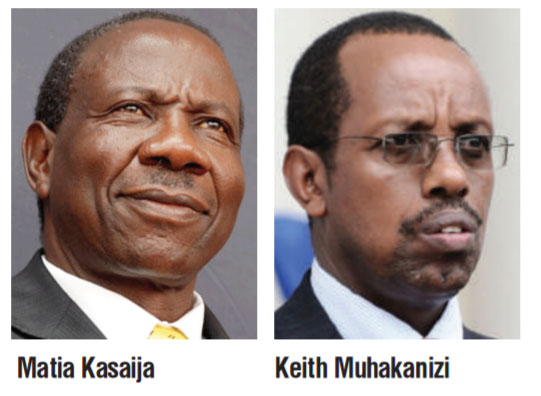Bategeka disappointed
Bategeka says he is disappointed by the government’s plan to borrow more generally and borrow more locally.
“We have been pushing for reduced domestic borrowing because of its impact on interest rates; so it is really unfortunate if government is instead increasing it.”
He said the more the government borrows from domestic commercial banks, the more the private sector is squeezed out of the borrowing market. He says if local businesses cannot borrow at good rates, means they will not have money to invest, and –if they cannot invest- they will not be able to create jobs. In the end the economy will grow far slowly than it should.
“If we are saying the policy is having private sector led growth, we need to walk the talk,” Bategeka says. He says instead of the government positioning itself as the only spender in the economy, it should support the capacity of the private sector businesses to borrow, spend, and perform.
“We need to cut government borrowing from domestic sources drastically because this denies the private sector operational capital,” he says.
But the government is not listening.
Instead, according to the FY2017/18 Budget Framework Paper (BFP), the government intends to raise its domestic borrowing from domestic borrowing from Shs. 1.351 trillion to Shs. 1.477 trillion. Commercial banks prefer to lend to the government because of the almost zero risk of loan non-performance. That mean no commercial bank will be hurrying to finance private sector projects. The few that offer token support will demand business killer interest rates.
Yet similar aggressive budgeting positions can be seen in the government’s determination to grow the budget to Shs30 trillion next year from the current Shs26 trillion. The 15% jump in the budget appears small but its impact is amplified because it comes at a time when the government main source of money; taxes from the Uganda Revenue Authority (URA), is not performing well. Going into the new financial year, government faces a revenue shortfall of about Shs400 billion due to poor revenue collections by URA.
Despite that, the government appears determined to walk a tight rope by projecting to increased URA’s target revenue collection from Shs13 trillion this FY to Shs15 trillion next year. In percentage terms, however, the new figure is 47% of the total budget compared to 49% of the budget in current FY. So the government is treading cautiously but in real numbers, since URA has shown an inability to expand the tax net, it still means that the few Ugandans who pay taxes are going to pay even more.

Kasaija’s tough job
Finance Minister, Matia Kasaija, usually delights with his firm tone and the way he pronounces certain words during budget speech readings. But when he reads next FY’s budget, things might play out a little differently.
Putting together the Shs30.2 trillion 2017/18 budget is proving ‘tough’ according to insiders, and Kasaija should look forward to a few boos when he reads what is already being called a “hard budget”.
Kasaija’s team of technocrats at the Finance Ministry appears aware of the challenge but see no way to increase revenue collections, get donor budget support back, and avoid increased domestic borrowing.
The only thing they appear to have control over is slashing budgets on education, health, and other social services.
The Education sector budget, which usually gets the third largest allocation, is projected to be slashed from Shs 2.4 trillion or 12 % of the budget to Shs 2.3 trillion or 10.4 %.
The health sector might see the biggest cut of about Shs.600 billion from Shs. 1.8 trillion or 8.9 % of total budget to Shs 1.2 trillion or 5.7% of budget.
The Law & Justice Sector might also be cut from Shs1.1 trillion to Shs950 billion.
Social Development too might see a cut from Shs 192 billion to Shs.172 billion.
On the other hand, the Finance Ministry proposes to increase allocation of the Works and Transport sector to Shs 5.5 trillion or 24.3 % of the entire budget up from Shs 3.8 trillion or 18.7%.
Energy and Mineral Development is projected to take Shs2.99 trillion or 13.2% percent up from 2.4 trillion or 11.6 % this year.
The security sector budget has also increased from 1.57 trillion or 7.7% to 1.9 trillion or 8.6 % of the budget.
The ICT and Lands budgets have also gone up in allocations and as a percentage of the budget.
The allocation to ICT is Shs89.9 billion or 0.4 % compared to Shs55 billion or 0.3 %, the previous year.
Lands and Housing, on the other hand, also got Shs217 billion or 1.0 % up from Shs147 billion in current FY.
Almost all the other sectors have seen a drop in their allocations as a percent of the total budget.
The actual figures might change when the 2017/18 budget is read in June, but the tendency in cuts and allocations will not change.
In an interview with The Independent, Muhakanizi defended the allocations.
“Government must make choices depending on its priorities,” said Muhakanizi, “You used to complain about poor infrastructure; now we are working on it. For the last three years we have been working on infrastructure and have opened up Uganda from border to border.”
Amos Lugoloobi, the chairman of the Parliamentary committee on the National Budget also told The Independent in an interview that he is happy that the budget addresses the critical priorities like Works and Transport, Energy, and even drought, which affects economic growth.
Irrigation interventions like construction of valley tanks in sub regions have been allocated Shs 23 billion. Lugoloobi said it will be good if the trend of investing in irrigation continues.
But Lugoloobi says he is frustrated that the government money is too little to address all the critical sectors like industry, development financing, and even agriculture. According to him, the budget for FY 2017/18 needed to be Shs34 trillion instead the current Shs30 trillion.
 The Independent Uganda: You get the Truth we Pay the Price
The Independent Uganda: You get the Truth we Pay the Price


